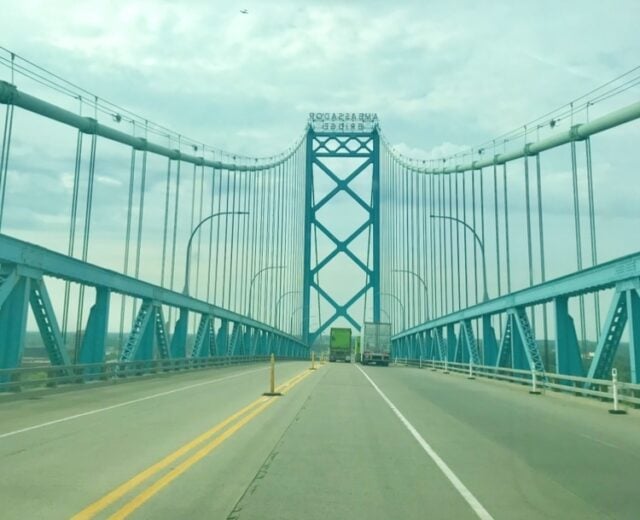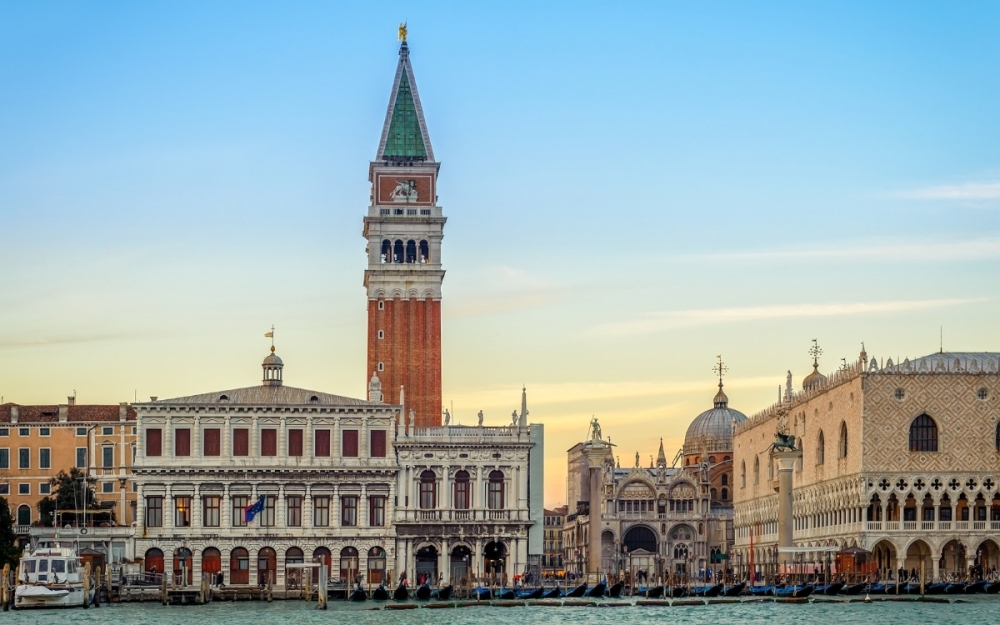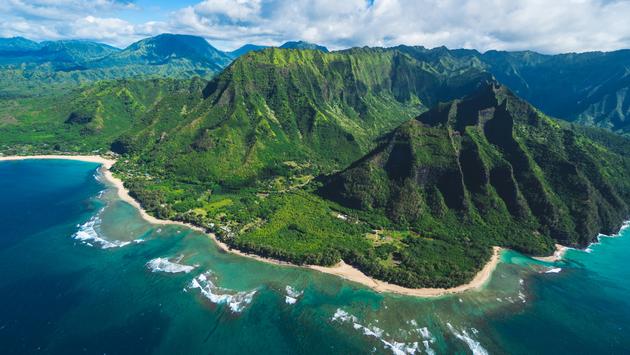The mere mention of borders might, given news coverage these days, default into political positions. Building a border wall in the southern United States; the “wet foot/dry foot” policy for Cuban migrants who float across the Florida Straits; Brexit bringing up talk of reinstalling a “hard border” dividing Ireland and Northern Ireland; and leaders symbolically stepping across a line separating North and South Korea at “House of Peace” are sensitive foreign policy matters.
As a traveler I have always been strangely fascinated by borders.
KID IN CANADA
I grew up crossing an international border almost weekly during summers in the Detroit area. My grandparents Art and Helen Shiels owned a cottage in Canada on Lake Erie about a 30-minute drive from Windsor, Ontario – which was across the river from the Motor City.
Living in the “Downriver” area of suburban Detroit, we could see the Canadian riverfront at the mouth of Lake Erie, but to get there we needed to drive into the city. Canadians frequented Detroit, too, to catch Detroit Red Wing NHL hockey games, see Broadway-style shows, shop in bountiful department stores such as Hudson’s, or do business with the auto industry and all of the spoils that meant…and still does, including glamorous gourmet restaurants, jazz clubs, and ethnic food opportunities in the Greektown, Mexicantown, and Poletown neighborhoods or Middle Eastern cuisine in Dearborn. These experiences, plus casinos, still exist in Detroit.
WATER BORDER
Detroit has an expansive, scenic mid-river waterfront park called Belle Isle, which is reachable by a short causeway bridge, but there was also, to the south, an amusement park called Bob-Lo Island, accessible by two gorgeous river cruise steamer boats, that was in Canadian waters. Michiganders leaving the island to board the boats for home after a picnic and park day had to pass through a very gentle immigration line at the dock.
SHUTTLE DIPLOMACY
For some reason my grandmother got top billing because my brother, sister and I referred to it as “Busia’s Cottage,” (“Busia” is Polish for “grandmother.”) Busia referred to their cottage as “going to the lake.” Our grandfather called it the beach.
The Detroit River, technically, is a strait. Either of our grandparents or parents driving us there for the weekend each Friday after work meant crossing the river – and border – via the scenic, suspension Ambassador Bridge or through the Detroit-Windsor Tunnel.
As a young boy I pestered my father Arthur Shiels Jr. to explain how cars could drive under the river. To display the tunnel concept, he filled the bathtub with water. Then he took the vacuum cleaner hose, much to my mother Gladys’ dismay, and placed the open ends of the hose at opposite ends of the tub while letting the middle of the hose sag down under the water to the bottom. Then, with string, he pulled a matchbox car through the hose to show me how the tunnel worked.
When driving through the tunnel, by the way, the U.S. and Canadian flags are painted on the tile wall at the spot midway through the river where the technical border is.
But we almost always traveled to Canada over the bridge, which made us kids happy because there was a McDonald’s right at the other side of the bridge. It made my grandfather happy because the bridge let off near Windsor Harness Raceway and he liked to use his fresh paycheck to bet the pacers and trotters.
POP QUIZ TO PASS
Each time our car pulled up to pass the immigration and customs booth at either end of the bridge it was intriguing, intimidating and mysterious. Some of the directional signs were in French.
Some of the officials were friendly. Some grumpy. Some serious and some lighthearted. Occasionally we’d get directed to pull over for a random (or was it?) inspection of the trunk and car. Conversely sometimes the officer would just tell us to beat it.
“Alright be quiet now,” our grandparents or parents would warn us as our car approached the gated booth. Each one of us had to declare our citizenship individually when asked. We were not to fool around.
But growing up my brother and sister and I overheard the story of one of my grandfather’s trips back to Detroit after a night at the racetrack or maybe even the “gentleman’s clubs” affectionately known as the “Canadian Ballet.”
One of the overserved, hiccupping men in the backseat, when asked to name his citizenship, thought it would be funny to blurt out the boozy answer: “Mother Russia!”
Personally, for his bold humor, I think the guy is a friggin’ legend. My grandfather and his friends didn’t though – especially after they sat on the sidewalk for two hours as every inch of their car – and persons – were searched.
CANADIAN CLUB
When my friends and I reached the age of 16 and got a driver’s license (you didn’t need a passport then to cross), we, too, would go to Windsor to drink. For us it was “Father-sized beers” at Mother’s Pizza Parlor because the Canadian drinking age was 18 – three years younger than it was in the USA.
But a truly legendary longtime partier was my Uncle Jerry, who set off for Windsor one summer day and ended up detained in Canada after a traffic stop. His car was impounded near the border for two weeks while Uncle Jerry himself was impounded a few months longer.
Jerry’s brother Denny eventually went to liberate at least his car from the impound and drive it back over the bridge to the states, but when he got inside the vehicle he was faced with a horrible surprise. When pulled over and detained two weeks previous, Jerry had been on his way to a beach party and was bringing with him a massive bag of fresh oysters, which had by now been fermenting in the back of the car impounded in the summer sun for 14 days!
Denny said even with all the windows down his drive back in the putrid car was unbearable and he lost his own lunch along the way. The car was a lost cause and had to be junked.
TRUTH OR CONSEQUENCES
The border officers typically ask standard questions about citizenship, where we were going, how long we planned to stay in Canada, and whether we were bringing any alcohol or firearms or anything else to declare. Occasionally they’d throw in a surprisingly simple but unexpected curveball question to see how we’d react. They were designed to break up the routine.
For instance, a lobbyist friend of mine was crossing the Blue Water Bridge from nearby Port Huron, Michigan into Sarnia, Ontario when the Royal Canadian Police asked him one of those so-called simple questions. The lobbyist told him that he was headed to Toronto for a few days of business meetings. In truth he was headed for Toronto’s Pearson International Airport to catch an Air Canada flight to Havana, Cuba.
The lobbyist’s story went up in cigar smoke when the officer asked him, “Where are you staying in Toronto?”
It staggered the lobbyist just long enough to be a “tell.” And it would have required yet another lie if he’d managed to answer, “The Royal York,” or some such property. He was therefore directed to pull over and taken into an office. When he could not produce his itinerary, officials directed him to call his office to have his assistant fax them his hotel reservation. When it became apparent this could not happen, the lobbyist revealed his true reason for driving into Canada.
He got a stern talking-to.
“We have very sophisticated methods to determine when people are lying to us,” the officer said. “We’re Canadian so don’t care that you’re an American going to Cuba. What we do care about is when you lie to us.”
SMUGGLER’S DELIGHT
Things got more serious after the 9-11 attacks and the pandemic, but before that there were plenty of fibs told by Americans going to the cottage communities on the Lake Erie shore outside Windsor. Upon arrival at the cottage, I remember the first question everyone always asked was, “how’d it go at the border?”
The Canadians always wanted something inconsequential brought over (smuggled) from the States and the Americans usually took something back. I recall that Canadian cigarettes were for some reason superior and Canadian “222’s” were headache pain killers but stronger because they contained codeine. The Seagram’s Whiskey distillery was in Windsor on the Detroit River, but taxes on booze were higher in Canada, so it was, oddly, a better buy in the USA. Canadian gas, sold in liters, was much more expensive, too.
You could also, in Canada, get Cuban cigars, which of course were forbidden in America due to the trade embargo against Fidel Castro’s regime.
STOGIE SMUGGLING
Like the lobbyist, I once drove across the Blue Water Bridge to Toronto to fly to Havana, Cuba. I knew I’d probably want to bring back some cigars, so I prepared my SUV for the purpose. I filled the back section with plenty of flotsam and jetsam like golf clubs, assorted items such as a box of Hefty trash bags, and, since it was December, ski boots.
The trip to Havana, which was done legally, was intriguing and upon landing back in Toronto, I prepared for my drive back across the Canadian border back into the USA. My story was that I was in Toronto for a few days on business, so I wore a dress shirt, sweater vest, suit and tie when I drove back across the Blue Water Bridge. I put my briefcase on the passenger seat.
Meanwhile the Cohiba and Montecristo cigars I brought back for personal use and some Christmas gifts were spread throughout the items in my trunk. Some were in the golf bag. Some in the ski boots. Some were in the Hefty trash bag box, etc. I thought I was pretty smart.
As I steered my car toward the U.S. immigration and customs booth, where I was next in line, a thought came to me that I hadn’t considered until that…very…moment: I was ostensibly in Toronto on business for four days in December. Toronto in December…where one definitely does not acquire a suntan!
“Just keep your heart rate down and breathe slowly,” I told myself. As I said that, I watched an upsetting event taking place involving the car in front of me. Instead of the typical quick questions and waved dismissals, I watched four men all in black come from nowhere and begin to give the fellows car the white-glove treatment! These “men in black,” like an Indianapolis 500 pit crew, with great efficiency opened all four doors and popped his trunk. They even ran a mirror underneath his car to see the undercarriage!
“This looks bad,” I told myself. “But it might actually be very good. If it’s a random check, you missed it by one!”
I admit I got a little charge out of the “007 feel” of it all, even though it was only cigars and I suppose the worst that could happen was they’d be seized.
My passage through the booth was uneventful – even anticlimactic. But what happened next, I will never forget.
BORDER BONANZA
Just as I drove down off the bridge and into Port Huron my phone rang. When I answered, it was one of my other traveling colleagues who also went to Cuba and was driving back to Michigan at the same time. He was a well-known public relations professional.
“Hola, amigo, ¿Qué bola?” I, with all the stress of the border behind me, playfully asked.
“MPS. Have you gone across the border yet?” he asked.
“Yes, just now, why?”
There was a bit of silence.
“Well, I was bringing back two boxes of Cohiba cigars I bought in Havana. The person traveling in the car with me became too nervous about getting them across the border. She is an immigration attorney and worried that if I got caught, she’d be implicated and damaged professionally,” he explained.
This time the pregnant pause came on my part. Until I broke the silence by asking him…”And?”
“And I placed the cigars in a trash can in the park along the river next to the bridge. Since you are traveling alone and are taking cigars across anyway, I thought I could tell you where they are, and you could pick them up and take them in.”
Yes, I briefly ran a scenario through my head in which I would turn around, drive back over the bridge, and immediately go through immigration and customs again. Briefly. But I knew better than to press my luck.
And if I had successfully somehow pulled that off and explained my way through it, I would be faced with the moral dilemma of whether to tell my public relations colleague that I’d salvaged his cigars.
It was December so the park was not likely to have many people in it for months. A dry, cold winter would dry them out and destroy them. So those cigars either happened to find their way to a lucky Canadian maintenance person…or went up in smoke.


